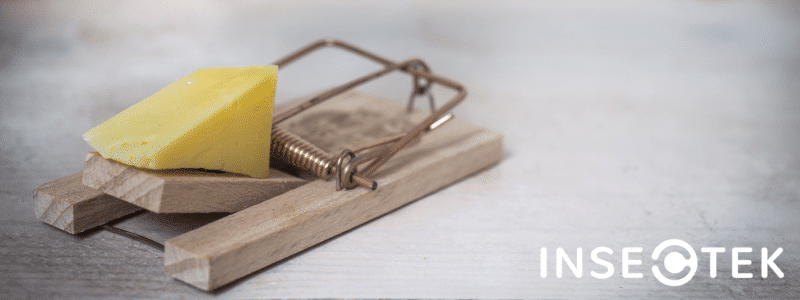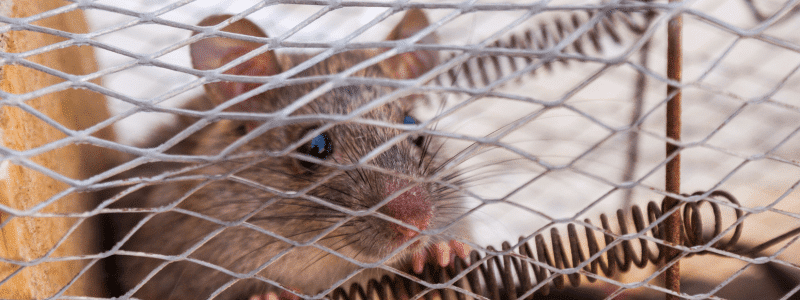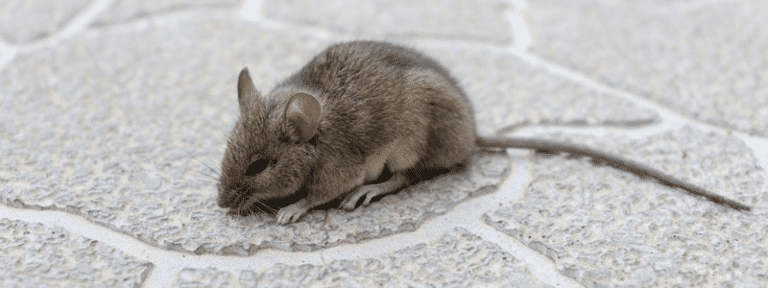Mice are one of the most challenging infestations in your home because they’re so elusive; you can hear them, smell them, and sometimes see them scurrying across your floor, but catching them and keeping them out?
That’s a real trick.
In this blog on mice infestations, we’ll examine the following topics:
- What do mice look like?
- What attracts mice to your home?
- What do mice eat?
- How do you know if you have a mouse infestation?
- What are the signs of a mouse infestation?
- What is the number one way to get rid of mice?
- What home remedy gets rid of mice fast?
- How do you prevent future mice infestations?
- What should you expect from professional mouse pest control?
What Do Mice Look Like?
Though most people have a decent idea of what mice look like, some key features distinguish them from other rodents you might find around your home.
Most standard house mice typically have:
- Grey or brown fur
- Small eyes
- Long, lightly-haired tails
- Triangular noses
- Thin bodies that are between 2-3 inches long
- Smaller droppings than rats
After you’ve read our guide, house mice will be easily identifiable and distinguishable from rats, giving you the upper hand you need over a mouse problem in your home.
What Attracts Mice To Your Home?
When house mice nest in your home, they’re scavenging for resources, like food. The most effective way to get them out is to cut them off from your food sources.
What do Mice eat?
- Nuts
- Meat
- Grains and seeds
- Sweets and berries
- Pet food
- Compost
- Leftover table scraps
Keeping your surfaces tidy and your food (including pet food) tightly sealed is one of the best ways to make your home less inviting to most pests, especially mice.
How Do You Know If You Have a Mouse Infestation?
Seeing a mouse run across your kitchen or bedroom floor is a strong indicator you have a mouse infestation in your home.
Does One Mouse Mean More?
Maybe it was a lone mouse, but it’s better to be safe than sorry – at the very least, getting your home inspected for an infestation ASAP will either begin your pest control process or give you peace of mind.
Signs of a Mouse Infestation
Here are common signs of a mouse infestation in your home without needing to spot one with your very eyes:
- Strong urine odor
- Gnawed furniture, plastic, or food.
- Grease marks on furniture, walls, or rugs
- Mouse droppings
- Tracks on surfaces
When you see these signs of mice, you don’t want to assume they’re simply passing through.
Contact your local pest control professionals immediately to see if you can take care of a potential mouse infestation in your home as soon as possible.
What is the Number One Way to Get Rid of Mice?

It’s hard to pinpoint a once-solid solution to mice infestations. As we mentioned, there are likely more when you see the sign of one mouse in your house. Thus, catching one is usually not the cure-all to a mouse infestation.
What Home Remedy Gets Rid of Mice Fast?
- Catch and release traps – Use food as bait, such as peanut butter or wet cat food, for catch-and-release traps to relocate the mice.
- Snap traps and poison traps – Unlike catch-and-release traps, these are kill traps designed to get rid of mice quickly and humanely.
- Scents – Mice have powerful senses of smell; Peppermint, cloves, or other essential oils can drive them away.
- Cats – Considering mice are a cat’s prey, having a cat roam around your property proves an excellent deterrent for mice.
- Sealing nests – If you can pinpoint where your mouse infestation originates, sealing their nest entrance from the outside can stop them from returning to your home.
- Food deprivation – If you seal off access to food, mice will have to move their nest elsewhere.
- Over-the-counter mouse repellant – There are safe repellants available in drug stores that can be sprayed in areas where infestations are present and near entry points.
- Steel wool – Because mice hate chewing through rigid material, steel wool is an effective tool for blocking crevices and cracks in the home.
- DIY spray – You can create hot pepper solutions (hot pepper chili flakes, dish soap, and water) to spray or dab with cotton balls in corners and areas indicating mice activity.
While these methods can effectively remove mice in your home, an actual mouse infestation likely requires more potent remedies or professional pest control services.
Related: Should You Do Your Own Pest Control in Phoenix?
Pest professionals will develop a unique plan and treatment for your property and will likely last longer than any DIY home remedies you may try.
How to Prevent Future Mice Infestations
Keeping mice away is a long-term game, and many involve consistent preventive measures.
To keep mice out, practice the following:
- Keep your home and surfaces tidy and clean
- Store food in airtight containers – including pet food
- Seal all cracks in your home and foundation
- Store firewood and other potential nesting materials away from your home
What to Expect From Professional Mouse Pest Control

When DIY measures aren’t stopping your mouse infestation, it’s time to turn to your local professional pest control company.
A high-quality mouse control technician will:
- Appraise your property and identify entry points for mice.
- Show you what might be attracting mice to your home.
- Create a detailed plan unique to your property and mouse infestation.
- Use property-safe and eco-friendly treatments.
- Keep detailed records to help monitor and prevent mice infestations.
The value of professional pest control for mice is that you won’t have to play the guessing game of what will and won’t work, potentially wasting your time and likely more money using ineffective home remedies.
Additionally, the likelihood of long-term success with DIY methods in keeping mice away is much lower than if you were to use professional services.
Published On: February 11, 2022
Updated On: March 14, 2023





